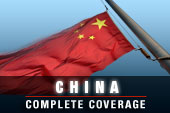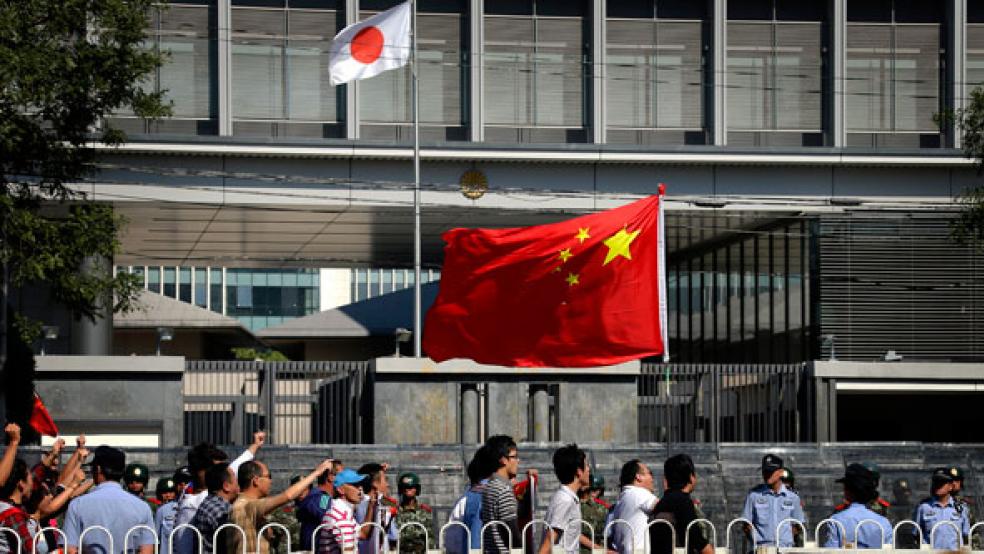China is now making East Asia as unsafe as it possibly can. Tokyo and Beijing are not that far from blows over a few forsaken rocks in the East China Sea. Is Beijing behaving badly because it wants to flex its muscles at the expense of a traditional adversary? For a century and more, China’s leaders have sought a galvanizing enemy whenever they have felt uncertain at home.

Xi Jinping will usher a new generation of leaders into office when he assumes the presidency next month. He is known already to be of a more forceful disposition than Hu Jintao, his predecessor. But Xi and his colleagues will sit in office more insecurely than anyone at least since Deng Xiaoping began the reform period three decades ago. And this insecurity is the source of China’s erratic, immature behavior.
Make no mistake about the gravity of this suddenly frightening state of affairs. The world’s three largest economies—the U.S., China, and Japan—are densely networked and interdependent, and they are all at risk given the U.S. pledge to aid Japan if it is attacked. Not surprisingly,
American diplomats have rushed to Tokyo and Beijing to try to resolve the ridiculous territorial dispute that has led to this escalating mess.
Tokyo has just charged the Chinese navy with aiming weapons-guiding radar at one of its warships. If it is true—Beijing denies the accusation—it does not get a great deal more provocative. The Japanese navy and air force say they are now prepared to fire warning shots in their future encounters.
The ostensible cause of this hard-to-believe brinksmanship is a set of islands in the East China Sea that Japan (which controls them) calls the Senkakus and which China calls the Diaoyus. In the 1960s geologists found evidence of oil and gas reserves beneath them. At this point the islands are a case for one of those law-of-the-sea adjudications, with joint development of resources a logical outcome.
But the islands themselves seem of secondary importance next to the tension China has created—with apparent purpose—across the sea it shares with Japan. Look at a map. These places are specks. No matter how desirous China is to possess them, it does not explain the string of recklessly aggressive provocations the Chinese navy and air force have indulged in since last autumn.
It is next to impossible to imagine a war breaking out. You do not make war against one of your largest investors and trading partners, notably with the Americans standing behind them. You do not make war against one of your primary sources of technology. What better explains China’s behavior is an increasingly fragile domestic environment that Chinese leaders are at a loss to address. It is the puffed-out chest that Beijing wants to strut. It makes the party and the nation appear to be synonymous, and a war is not needed.
Japan has been China’s favorite punching bag for more than a century. Think of Japan’s disputatious history texts, think of the “comfort women” forced to serve the imperial army, think of the Nanjing Massacre. Now it is islands—our islands since the 14th century, the Chinese say. So we witness a ploy Beijing has used at least since the last dynasty: When things are unsettled at home, there is a deep reservoir of nationalist sentiment to tap. If victimhood were an export, China would be rich beyond believing.
This week, millions of Chinese will celebrate the Lunar New Year with fireworks brand-named “I Love Diaoyu Islands” and “Tokyo Big Explosion.” This is the consequence of the official media’s provoking, propagandistic anti–Japan coverage of the islands question. It is not a strong nation talking: It is an uncertain one.
We can discern why easily enough. China’s model, its political economy, is cracking; it has reached its limit. High growth in exchange for no real political participation, extravagant displays of corruption, censorship, a sequestered political class, and a shocking degree of lawlessness: These are what the model has consisted of, and each is generating opposition that is ever more persistent and widespread.
People are now going to jail because they have protested against air and water pollution. Corruption is now an everyday topic among the Chinese and in the media.
Scholars, intellectuals, and editorialists—including some writing in party-controlled publications— are clamoring for the leadership to open up simply by observing the nation’s customarily ignored constitution.
One of the most interesting events in this line occurred last month, when a newspaper in Guangzhou, Southern Weekly, was censored in what appears to have been routine fashion. A nationwide protest swept across the internet. “Our yielding and our silence have not brought a return of our freedom,” a group of students wrote in support of the paper. “Quite the opposite, they have brought the untempered intrusion and infiltration of rights by power.”
It scarcely sounds like China. And it isn’t, really. Southern Weekly eventually reappeared, but so did a harsh clampdown on censorship of the non-state media.
Last Friday China announced some stunning new economic figures. Exports grew 25 percent in January from the year earlier. The trade surplus for the month was $29.2 billion. And it is official now: China has just surpassed the U.S. as the world’s No. 1 trading nation: $3.82 trillion in trade last year for the U.S., $3.87 trillion for the Chinese.
I do not recall ever being so discouraged by a great set of statistics. These reminded me of the truth about China’s leadership today. It has nothing to offer but high growth, and high growth alone cannot address the mainland’s multiplying problems. It is high growth that produces these problems: Prosperity leads to demands for political and social change when political and social institutions are lacking. We have seen this numerous times before.
There is no question that prosperity is also producing a more assertive China. It wants to be heard, and it wants its voice to be powerful. Deng used to preach a “hide your strength” strategy for the China that had just emerged from the Cultural Revolution. Those days are over. But so are the days when economic growth alone will pacify the Chinese—and when risky displays of power abroad can be used to manage the desired measure of nationalist fervor at home.






